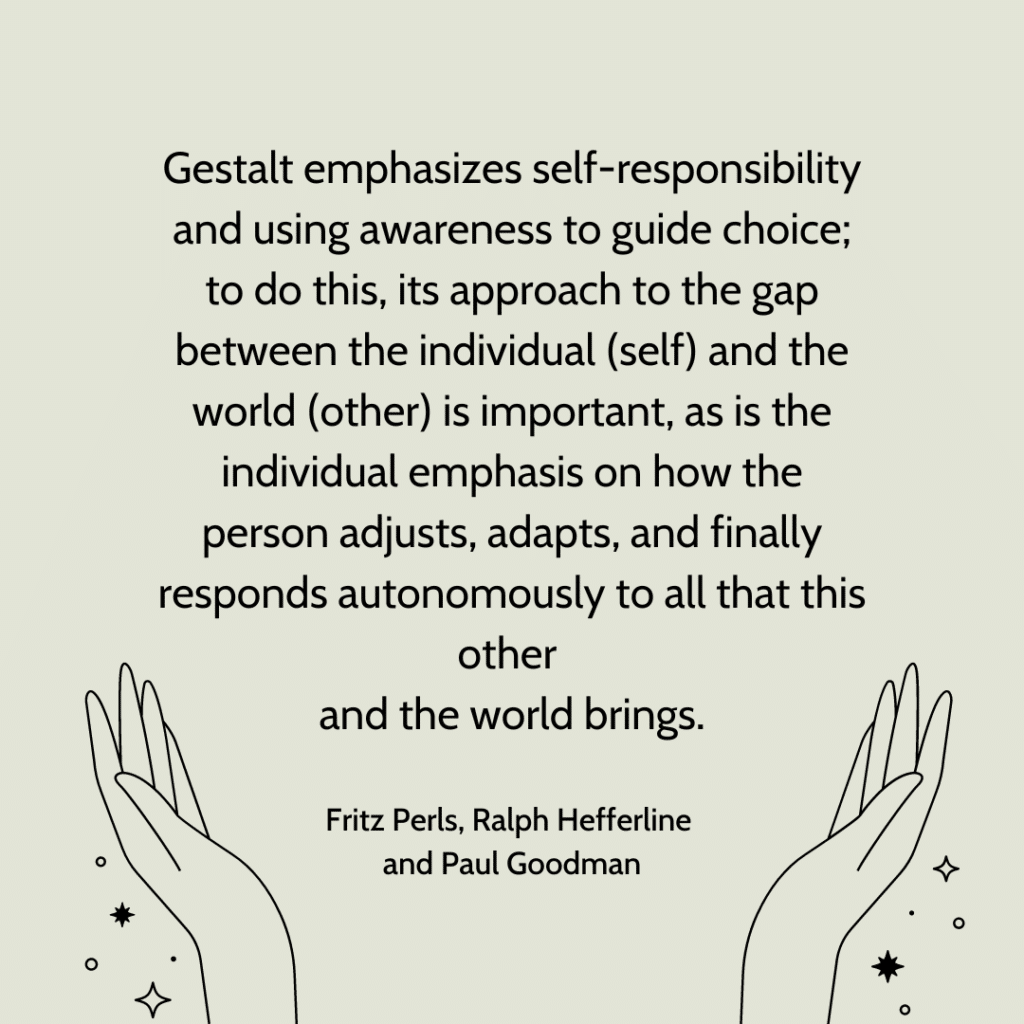
Introduction: Gestalt Therapy, a dynamic and experiential therapeutic approach, invites individuals to explore their thoughts, feelings, and behaviors in the context of their present experiences. Developed by Fritz Perls, this humanistic and holistic approach emphasizes awareness, self-acceptance, and the integration of mind, body, and emotions. In this blog post, we’ll delve into the world of Gestalt Therapy, its fundamental principles, unique techniques, and how it can empower individuals to connect with their authentic selves and foster personal growth.
Understanding Gestalt Therapy: Gestalt Therapy, often referred to as the “here and now” therapy, focuses on the present moment and emphasizes the importance of being fully engaged in one’s experiences.
Core Principles of Gestalt Therapy:
- Holistic Approach: Gestalt Therapy views individuals as complex beings with interconnected thoughts, emotions, and physical sensations.
- Awareness: The therapy places great importance on self-awareness, encouraging individuals to explore their thoughts, feelings, and behaviors in the present moment.
- Responsibility: Clients are encouraged to take responsibility for their own thoughts, feelings, and behaviors, fostering a sense of empowerment.
Key Techniques of Gestalt Therapy:
- Empty Chair Technique: Clients engage in a dialogue with an imagined person or an aspect of themselves, allowing for the exploration of unresolved emotions or conflicts.
- Exaggeration Technique: Clients are encouraged to exaggerate gestures, expressions, or movements to bring suppressed emotions and thoughts to the surface.
- Dream Work: Dreams are explored through the lens of Gestalt Therapy, focusing on the different elements of the dream as aspects of the self.
- Two-Chair Technique: Clients move between two chairs, representing conflicting emotions or thoughts, helping to integrate these conflicting aspects.
Benefits of Gestalt Therapy:
- Enhanced Self-Awareness: Gestalt Therapy promotes deep self-exploration, leading to a greater understanding of one’s thoughts, emotions, and behaviors.
- Emotional Processing: Clients have the opportunity to process and integrate suppressed emotions, leading to emotional healing.
- Improved Communication: Gestalt Therapy enhances communication skills, helping individuals express themselves authentically.
- Empowerment: Taking responsibility for one’s thoughts and actions leads to a sense of personal empowerment and self-efficacy.

Applying Gestalt Principles in Daily Life:
- Mindful Presence: Practice being fully present in your daily experiences, engaging all your senses.
- Acknowledge Feelings: Embrace your emotions without judgment, allowing yourself to feel and process them.
- Authentic Expression: Communicate openly and authentically in your interactions, expressing your thoughts and feelings honestly.
Conclusion: Gestalt Therapy offers a profound journey of self-discovery and personal growth through the lens of authenticity and self-awareness. By immersing oneself in the present moment, exploring suppressed emotions, and integrating conflicting aspects, individuals can connect with their true selves and unlock their potential for transformation. As we embrace the principles of Gestalt Therapy in our daily lives, we invite wholeness, authenticity, and self-empowerment, fostering a deeper connection to ourselves and those around us. Ultimately, Gestalt Therapy serves as a powerful reminder that personal growth and healing are ongoing processes that can lead to a more fulfilled and authentic life.
